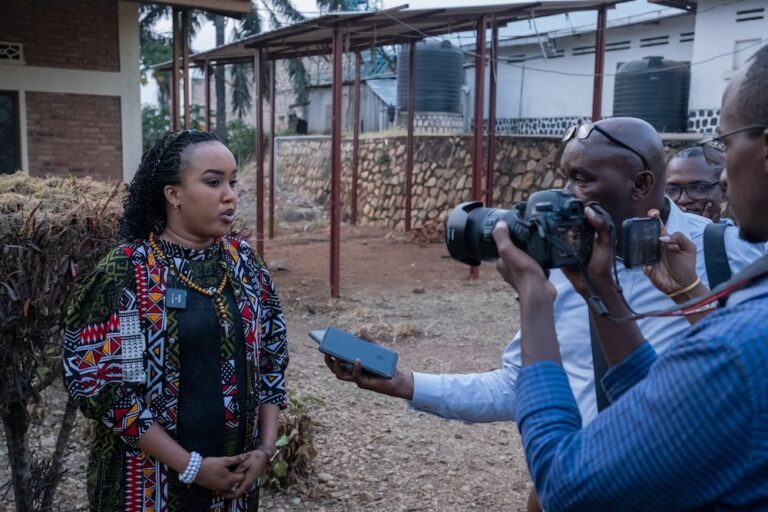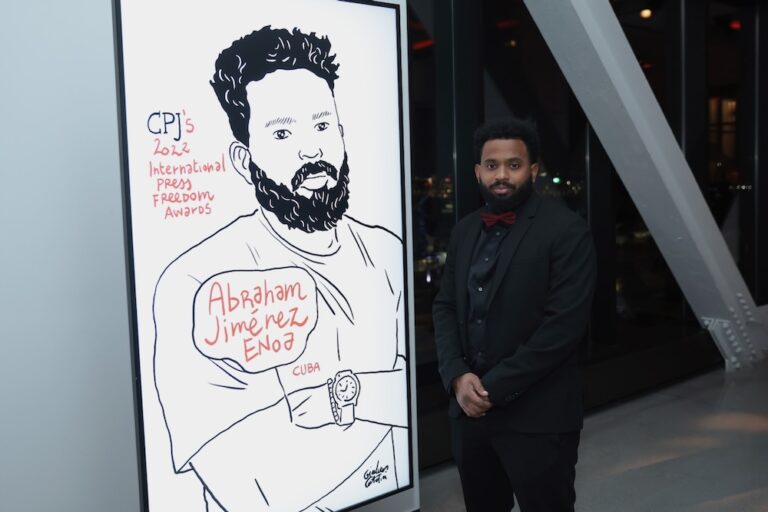Governments around the globe increasingly perceive journalists who report critically on stories of public interest to be destabilizing elements, threats to national security, and even terrorists.
Written for CJFE by José Gonzalez
The government of Burma’s slow crawl towards substantive democracy was once again delayed on July 10, 2014, when five journalists from the magazine Unity Weekly were sentenced to 10 years in prison with hard labour for the crime of publishing state secrets, trespassing, taking photographs, and “abetting,” in what has come to be known as the “Unity Journal” case. The ruling cements Burma’s position as one of the world’s worst offenders in terms of press freedom violations, and is also indicative of a particularly disturbing trend. Governments around the globe increasingly perceive journalists who report critically on stories of public interest to be destabilizing elements, threats to national security, and even terrorists.
The five Burmese journalists in question, chief executive officer U Tin San, along with editorial staff U Ya Zar Oo, U Paing Thet Kyaw, U Sithu Soe and U Lu Maw Naing, were charged after publishing a story in Unity Weekly alleging that a government-owned factory was producing chemical weapons; something the government has resolutely denied. In a move clearly designed to silence reporting on a potentially embarrassing topic, the group was charged under the 1923 Official Secrets Act, an archaic and outdated law passed during Burma’s time as a British colony.
The sentencing drew criticism from international press freedom organizations and the U.S. State Department, all of which are increasingly concerned with the state of press freedom in Burma. The legal battle of the “Unity Journal” case led to the bankruptcy of the magazine, a potentially intentional outcome, considering that government officials had questioned the publication on its finances in the past. Such economic intimidation is not uncommon for the Burmese government and is not limited to Unity Weekly.
Speaking to TIME, Aung Zaw, editor of Irrawaddy news magazine said, “They come to our office and other media offices asking petty questions: ‘How are you making money?’ ‘Are you making a lot of business?’ ‘Are you making a profit?’ […] It’s clearly intimidation.”
In another case, just days after the sentencing of the Unity Weekly journalists, an editor, his wife, and an employee working for the Bi Mon Te Nay journal were apprehended in Thailand and deported back to Burma. On their arrival home, they and their colleagues were charged with violating the 1950 Emergency Provisions Act, allegedly undermining state security, and causing public alarm. The group of journalists had published a story that mistakenly stated that opposition leader Aung San Suu Kyi and several ethnic minority leaders had formed a new interim government.
The cases of Unity Weekly and Bi Mon Te Nay are indicative of Burma’s increasing hostility to journalists within its borders, a stark contrast to the reforms supposedly enacted in 2012. The latter example highlights another aspect of the problem, cooperation between regional governments in pursuing journalists accused of undermining state security.
Burma and Thailand have a strong working relationship for pursuing criminals that cross their borders. Although this is typically with regards to drug and human traffickers, there has been a move towards persecuting alleged criminals accused on political grounds. This new level of cooperation came shortly after the Thai government’s National Council of Peace and Order released an edict banning journalists from criticizing the actions of the ruling military junta. Criticisms of the edict from groups including the Thai Journalists Association have so far been brushed aside.
The issue is not restricted to Southeast Asia, however; the pretext of protecting state security is increasingly being used to prosecute journalists around the world. Iran continues to take a hostile stance towards journalists and human rights defenders, in spite of the promise seen in early reforms enacted by President Hassan Rouhani. In June of this year, journalist Serajoddin Mirdamadi was sentenced to six years in prison for undermining state security. On July 24, several more journalists, including the Washington Post’s Tehran correspondent Jason Rezaian, were also arrested. Many have speculated that the latter group of journalists was arrested by hardliners within the regime seeking to retaliate against Rouhani’s comparatively moderate policies. Iran’s prosecutor has only said that the group was detained for “security reasons.” While an unidentified Iranian-American photojournalist from the group was released on bail on August 21, Rezaian and his wife, an Iranian journalist, remain in detention and their whereabouts are unknown.
An even more shocking case in Iran was the sentencing of journalist Marzieh Rasouli, given two years in prison along with 50 lashes on July 7, on charges of spreading anti-government propaganda. More specifically, the government claims that Rasouli was “acting against national security,” although no specific action has been highlighted. Much of her journalism has focused on arts and culture –seemingly benign topics – but their publication in reformist media outlets coupled with Rasouli’s participation in a 2008 protest brought her under fire from the Iranian regime. These recent developments bring the total number of journalists imprisoned in Iran to 65, making them one of the world’s leading jailers of journalists.
One of Iran’s closest competitors when it comes to imprisoned journalists is Turkey. The leading jailer of journalists in both 2012 and 2013, the Turkish government has been no friend to advocates of press freedom, often equating journalism with terrorism and charging journalists under anti-terror legislation.
Award-winning journalists Ahmet Şık and Nedim Şener were jailed for over a year (2011-2012) as suspected members of Ergenekon, an alleged terrorist organization charged with attempting to overthrow the Turkish government. A major piece of evidence used to imprison Şık was a book he wrote in 2011 titled The Imam’s Army, detailing the influence of U.S.-based Islamic scholar Fethullah Gülen on individuals in the Turkish police and judiciary. The book was equated to a bomb by Prime Minister Recep Tayyip Erdoğan, and thus construed as a threat to state security. The “Ergenokon trials” have been widely decried as politically motivated and designed to ensnare critics of the Turkish government.
Ahmet Şık and Nedim Şener both later took the Turkish government to court in the European Court of Human Rights (ECHR), arguing that their rights to free expression and to a fair trial were violated. In an optimistic development, Şık and Şener actually won the case, with the Turkish government being ordered to pay significant damages to both journalists. While this ECHR ruling sets an important precedent for journalists facing censorship cloaked in concerns of state security, it must be noted that these two successes stand in stark contrast to over 200 Turkish journalists, lawyers, and academics who were convicted as part of the Ergenekon trials.
More broadly speaking, Şık and Şener’s victory against the Turkish state also serves as a small counterpoint to the growing number of countries using state secrets as a pretext for censoring journalists. Substantial gains, like Burma’s Press Council being granted mediation rights in the aftermath of the “Unity Journal” case, do reflect an awareness of international outrage against jailing journalists on trumped up charges, but they are few and far between. Three Al Jazeera English journalists remain unjustly imprisoned in Egypt on terrorism charges, and at least 11 more journalists are currently detained in the country for their work. China is in the midst of bolstering laws that punish journalists for publishing state secrets, and NSA whistleblower Edward Snowden continues to face felony charges under the Espionage Act and the prospect of up to 30 years in prison if he returns to the United States.
In the face of government attempts to imprison journalists for speaking out on issues of public interest, campaigns for their freedom such as #FreeAJStaff take on vital importance in creating international pressure for their release. We can only hope that continued, concerted public pressure can exert impact on government policies and decision-making, leading to better protections for journalists charged under anti-terror legislation.
José Gonzalez is a freelance journalist currently working in Toronto, Ontario. Follow José on Twitter @JGonspy


